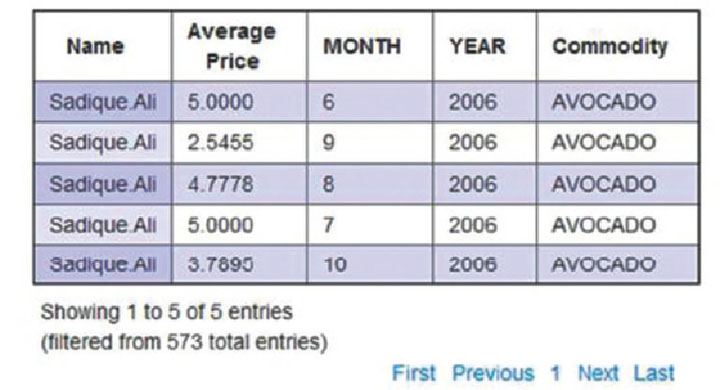Farmers may soon be benefiting from an app developed by three computer science graduates that analyses their commodity pricing and helps them better utilise their resources to take advantage of the market.
After winning the Open Data Code Sprint competition held at the International Conference Centre on April 11 and 12, members of Team Sirca— Amanauth Persaud, Jason Plummer and Richard Cheng-Yuen—told Stabroek News that the next phase of the competition will see them developing the application into a production model.

They have been given about one month to fully develop the application, they said. Most of the code, they explained, will have to be rewritten in order for the application to be easily maintainable, since certain practices had to be ignored in order to have a workable application within the 24-hour time period they were initially granted to develop the idea.
Now given one month to work on the application, we plan to get some input from the Guyana Marketing Corporation as well as its permission to use commodity pricing data supplied by them to further enhance and develop the application ready to be deployed to farmers in Guyana, they told this newspaper.
The application, ‘Farmer App’, is a web-based tool that analyses commodity pricing data that have been gathered from various authorities and then uses this information to help farmers better utilise their resources to take advantage of the market.
The basic concept behind the application, they said, is that a solution can be made available to farmers providing them with tools to make them more competitive in the agriculture sector. Future work of this application the team said is that the solution can be refined into a community market place for farmers where buyers can seek out, buy, or even reserve commodities until harvest time from increasing commerce within the agriculture sector.
They have already managed to develop three features of the web application, they said.
The first feature, Crop Planner, works by collecting details from the farmer, the commodity the farmer wishes to plant and the time to harvest the said commodity.
With this input, they said, the crop planner displays the average prices of the commodity throughout the year via a bar graph.
Also displayed are the total dollar cost of all transactions throughout the year, the price and total dollar value of the commodity in question and lastly, recommendations for the two highest grossing commodities in the harvest month.
The second feature of the application is Crop Comparison which displays the statistical data of any two commodities showing the comparison of prices and total sales during the year. Farmers, they said, can use features of the application to plan their planting and harvesting schedules so that they can take better advantage of the market during the course of the year.
Farmer History the last feature of the application displays the average price the farmer received for his commodity that he sold.
The farmer can use this to better calculate his return on investments during the course of the year.
The team told this newspaper that another notable feature of the application is that it is extremely scalable on all platforms; it has the ability to display the information on any screen, be it a mobile phone or a desktop computer.
One of the major problems they faced during the competition they told this newspaper is that their dataset started in 2006 and abruptly ended in 2008. This, they said, caused them to rewrite their algorithms for average prices for demonstration purposes since the programme had based all its calculations on current day prices.
Open Data Code Sprint is a competition involving Caribbean countries where teams of developers compete to build solutions to social problems using open data. This is the first time that Guyana has taken part in the competition. The competition focused on open data, software innovation, and technology trends and highlighted the focus on open data as a catalyst for regional development.
Lendalar Singh, Head of the Computer Science Department said, “The success of DevCA 2013 Guyana is significant for the Department of Computer Science in many ways. It is the first time an event of this type took place in Guyana. We have demonstrated that we have the capacity and skill to organise and host an event of this nature.
This has given us the confidence to take on similar challenges in the future. We are more delighted because this event has demonstrated that we are working towards the development of ICTs at a national level. Further, this event has illustrated tangibly the quality of graduates that the Department of Computer Science produces.
All of the programmers at this contest are graduates of the department or current students. They have demonstrated the extent of the talent pool available in Guyana on the software development space,” he said.
He added that the top three teams from the competition locally will go forward to the next stage where they will receive support from technical experts across the Caribbean to further develop their ideas.
They will also receive technical support to develop business strategies for turning the applications into commercial ventures.
He also added that they hope some of the applications development will find local interest from the business community and from public institutions.
“We will know shortly when the regional stage of the event takes place. It is not a competition but an open support system for all of the top teams across the regions,” he added.




